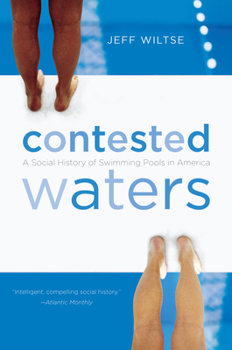Contested Waters: A Social History of Swimming Pools in America
Select Format
Select Condition 
Book Overview
From nineteenth-century public baths to today's private backyard havens, swimming pools have long been a provocative symbol of American life. In this social and cultural history of swimming pools in the United States, Jeff Wiltse relates how, over the years, pools have served as asylums for the urban poor, leisure resorts for the masses, and private clubs for middle-class suburbanites. As sites of race riots, shrinking swimsuits, and conspicuous leisure,...
Format:Hardcover
Language:English
ISBN:080783100X
ISBN13:9780807831007
Release Date:April 2007
Publisher:University of North Carolina Press
Length:288 Pages
Weight:1.30 lbs.
Dimensions:0.1" x 6.1" x 9.3"
Customer Reviews
4 ratings
Awesome book!
Published by Thriftbooks.com User , 14 years ago
I needed this book for school and I wanted it for personal reasons. I am glad that I finally found it. It is very informative and well written.
Great
Published by Thriftbooks.com User , 14 years ago
It was sent on time and arrived in good condition - as described. When the post office seemed to have lost my book (no fault of the seller), the seller was prompt in forwarding shipping confirmation info.
Bringing History Alive
Published by Thriftbooks.com User , 16 years ago
This is a must read for every teen or adult that believes history is simply about boring dead white people and inconsequential dates. Can you write a "real" history book that has valid arguments about.....SWIMMING POOLS? Dr. Wiltse has caught the attention of the young people of this nation who believed that history, real history, has to be about a President, King, or a General, and has taught us all that seemingly mundane events in the lives of common people, often overlooked, are history too!
A Social History of an Unusual Aspect of America
Published by Thriftbooks.com User , 17 years ago
Here comes summer, and Americans will head for a trusted way of getting rid of stress and heat: they will jump into swimming pools. But pools themselves have been a source of stress to many communities within the nation; indeed, Jeff Wiltse has written a history of the social tensions pools have caused (and sometimes eased) in _Contested Waters: A Social History of Swimming Pools in America_ (University of North Carolina Press). It is surprising that what might seem a trivial subject, a pastime in which millions of Americans have innocently indulged for over a hundred years now, might even have a history. But Wiltse, who teaches history at the University of Montana, has driven from town to town to draw information for this book. His travels were mostly in the north, for he did not want to range too far and write separate regional histories, although he says the pattern of social use of pools is consistent within the towns he surveyed. He amassed a huge amount of data from newspapers and civic documents about who was using the pools, with statistics often kept by race and sex. Wiltse has shown beyond doubt that pools have reflected and generated our feelings on sexual and racial matters, and although his book is a serious academic history, it is by turns amusing and sad as America came to an incomplete understanding of how we ought to treat pools and the swimmers who use them. We didn't have pools originally, going down to swim in the river or "the old swimming hole". The swimmers often had no running water at home and this was a way for them to wash away some bodily grime; their Victorian betters strongly agreed with bathing for this purpose, but not with the way it was being accomplished. The problem of how to get those underclass clean without letting their pastoral cavorting offend others resulted in a solution, the first municipal bathing pools. Remarkably, there was not racial segregation in these initial pools. Pools changed again when they became not centers for training but locales for play. The huge pools were viewed as resorts, places where a family might come on vacation, and they had sand around them for artificial beaches. Pools had been segregated by gender, but these were not; because of fretting over what might happen if white women saw athletic black bodies, or if blacks started appreciating the displayed bodies of white women, racial segregation of pools began. There was violence in many cities when black people tried to use the pool. The way one city after another attempted to exclude black people in different ways makes for uncomfortable reading. Desegregation eventually happened, but the victory turned out to be Pyrrhic. As blacks were admitted, white swimmers stopped going to the public pools, and so it became easier for cities to reduce maintenance on the pools, which fell into disrepair and were closed. Cities had financial crises in the 1970s, further reducing pool budgets, and have never started up anot






